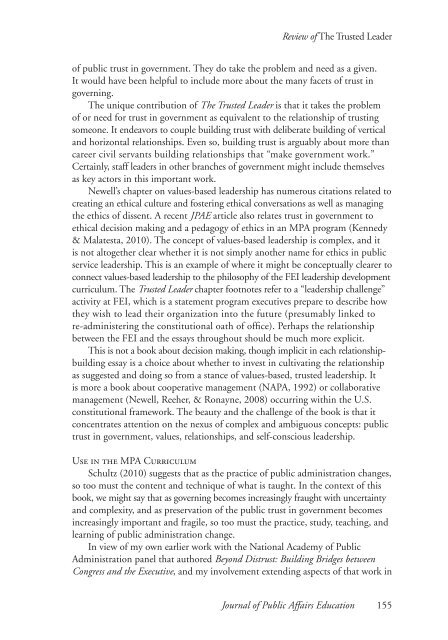Journal of Public Affairs Education
Create successful ePaper yourself
Turn your PDF publications into a flip-book with our unique Google optimized e-Paper software.
Review <strong>of</strong> The Trusted Leader<br />
<strong>of</strong> public trust in government. They do take the problem and need as a given.<br />
It would have been helpful to include more about the many facets <strong>of</strong> trust in<br />
governing.<br />
The unique contribution <strong>of</strong> The Trusted Leader is that it takes the problem<br />
<strong>of</strong> or need for trust in government as equivalent to the relationship <strong>of</strong> trusting<br />
someone. It endeavors to couple building trust with deliberate building <strong>of</strong> vertical<br />
and horizontal relationships. Even so, building trust is arguably about more than<br />
career civil servants building relationships that “make government work.”<br />
Certainly, staff leaders in other branches <strong>of</strong> government might include themselves<br />
as key actors in this important work.<br />
Newell’s chapter on values-based leadership has numerous citations related to<br />
creating an ethical culture and fostering ethical conversations as well as managing<br />
the ethics <strong>of</strong> dissent. A recent JPAE article also relates trust in government to<br />
ethical decision making and a pedagogy <strong>of</strong> ethics in an MPA program (Kennedy<br />
& Malatesta, 2010). The concept <strong>of</strong> values-based leadership is complex, and it<br />
is not altogether clear whether it is not simply another name for ethics in public<br />
service leadership. This is an example <strong>of</strong> where it might be conceptually clearer to<br />
connect values-based leadership to the philosophy <strong>of</strong> the FEI leadership development<br />
curriculum. The Trusted Leader chapter footnotes refer to a “leadership challenge”<br />
activity at FEI, which is a statement program executives prepare to describe how<br />
they wish to lead their organization into the future (presumably linked to<br />
re-administering the constitutional oath <strong>of</strong> <strong>of</strong>fice). Perhaps the relationship<br />
between the FEI and the essays throughout should be much more explicit.<br />
This is not a book about decision making, though implicit in each relationshipbuilding<br />
essay is a choice about whether to invest in cultivating the relationship<br />
as suggested and doing so from a stance <strong>of</strong> values-based, trusted leadership. It<br />
is more a book about cooperative management (NAPA, 1992) or collaborative<br />
management (Newell, Reeher, & Ronayne, 2008) occurring within the U.S.<br />
constitutional framework. The beauty and the challenge <strong>of</strong> the book is that it<br />
concentrates attention on the nexus <strong>of</strong> complex and ambiguous concepts: public<br />
trust in government, values, relationships, and self-conscious leadership.<br />
Use in the MPA Curriculum<br />
Schultz (2010) suggests that as the practice <strong>of</strong> public administration changes,<br />
so too must the content and technique <strong>of</strong> what is taught. In the context <strong>of</strong> this<br />
book, we might say that as governing becomes increasingly fraught with uncertainty<br />
and complexity, and as preservation <strong>of</strong> the public trust in government becomes<br />
increasingly important and fragile, so too must the practice, study, teaching, and<br />
learning <strong>of</strong> public administration change.<br />
In view <strong>of</strong> my own earlier work with the National Academy <strong>of</strong> <strong>Public</strong><br />
Administration panel that authored Beyond Distrust: Building Bridges between<br />
Congress and the Executive, and my involvement extending aspects <strong>of</strong> that work in<br />
<strong>Journal</strong> <strong>of</strong> <strong>Public</strong> <strong>Affairs</strong> <strong>Education</strong> 155



